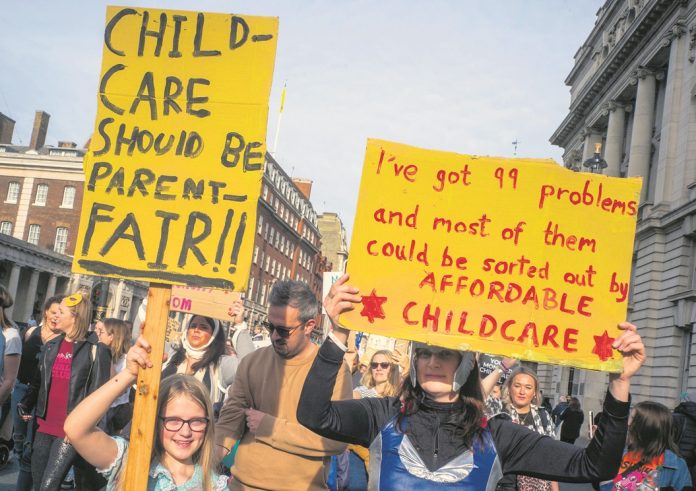Alex Sampson, Plymouth Socialist Party
In his 2023 spring budget, Tory chancellor Jeremy Hunt announced big changes to the free provision of early-years childcare. Due to come into effect early in 2024, 15 hours of ‘free’ provision is being extended to two- to three-year-old children of working parents. And from September 2025, all eligible children over nine months old will get funding for places for up to thirty hours a week.
On the surface, this seems like a welcome introduction for the many parents who currently struggle with some of the highest childcare costs of any advanced capitalist country. The reality is that without proper funds, recruitment and training it will overburden an already stretched sector.
A decade of underfunding has already led to a crisis in the nursery sector. The current level of government funding means that nurseries are running at a shortfall of approximately £2.31 per child, per hour. This shortfall is made up, where possible, by charging paying parents more per hour or by charging for extras, such as snacks or meals. As the cost-of-living crisis continues and overheads continue to rise, this shortfall is only increasing. The result has been an 87% rise in the number of nurseries closing. Those who are still open can run a shortfall of up to £32,000 a year due to the current funding model.
Also exacerbating the crisis are massive staffing shortages. Due to low wages, high stress and a forthcoming relaxation of staff:child ratios from 1:4 to 1:5, uptake of available positions is low. A report by the Early Education and Childcare Coalition found that 57% of nursery staff interviewed are thinking of leaving the industry in the next 12 months.
New government policy would require an expansion in the early-years workforce of at least 8% to meet increased demand. This is looking increasingly unlikely to happen by April. Only about 17% of early-years providers say they are able to increase the number of available places offered in 2024.
As the funded nursery places scheme expands over the next two years, the cracks in the system will only widen further. The effects will be seen more in deprived areas, where the proportion of government-funded childcare places are higher. Already almost 30% of nursery closures over the last year have taken place in the most deprived areas.
The loss of childcare places in these areas naturally has the knock-on effect of forcing more parents or extended family carers, usually women, out of the workplace and back into the home as alternative childcare costs are too high.
Richer families likely to benefit from childcare reforms by almost 6 times vs lower income families
Private sector
It is not just nursery places in deprived areas that face threats, however, as private equity and venture capital sectors have moved into investing in nurseries, buying up large numbers of previously not-for-profit or collapsing businesses. This causes a very real existential threat to the sector, as has been demonstrated by the disaster of the privatised adult social care system. These private equity firms run a risky business model of rapid expansion, high debts and minimal cash reserves that, while maximising profitability, leave them exposed to financial difficulties and bankruptcy. The future educational success of far too many children now hangs in the balance of profit margins.
It is not an exaggeration to say that the early-years education system is teetering on the edge of collapse. Yet the Conservative government will not invest what is needed to boost the sector. The Labour Party, which is likely to be in power by the time the whole of this scheme comes into effect, is also unwilling to commit to improving funding to the industry, citing ‘fiscal responsibility’ and the need for caution.
The capitalist system, which looks at the childcare sector only in terms of what profit is to be made, cannot prevent further collapse of the system.
We need a fully nationalised nursery sector, well-funded with living wages for all staff, free for all children and under local democratic control. A socialist society would guarantee our children the bright future they all deserve.








